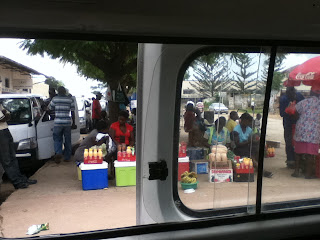Mbare is Harare's first 'township' (now officially called 'locations' or 'high-density suburbs'), built originally to house the black labour force working in nearby white-owned factories. It is in a sense the heartbeat of Zimbabwe; the country's largest bus terminal is here, beside the country's largest market (msika). It is a place of sensory overload, thronging with people, colours, sounds, and smells. The roads around the market and bus terminal are choked with trucks bringing in produce and wholesale goods, carts pulling smaller quantities of these around, buses and kombis, people en route to or from their kumusha (rural area), or shopping, or just passing the time, and vendors lining both sides of the streets with their small piles of goods: fruits and veggies, catapults (slingshots - used with amazing accuracy in the rural areas to hunt birds and small animals, and drive away baboons from fields), brooms, spices, cooking oil, toilet tissue, soap, airtime, pirated cd's and dvd's, hardware items, rope, cloth, clothing, herbal remedies.... There is an open wholesale market, and then a retail market next door with acres of stalls, selling all the same things the vendors along the streets are selling; also a craft market and a variety of shops. It is absolutely impossible to do justice to it with my ipod, and anyway a white person bringing out a camera instantly becomes a spectacle, so most of these photos were shot rather surreptitiously.
Mbare bus terminal
Broom vendors
Cart-haulers, waiting for business.
Informal street eateries abound, mostly selling sadza (the staple food; a stiff cornmeal porridge) with meat and some veg.
Driving into and out of the market can take a lonnnnnng time.






















































